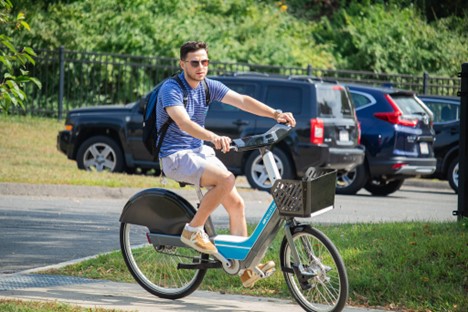In May 2023, Pioneer Valley’s bikeshare program ValleyBike was halted after the operator of the program, the Canadian firm Bewegen, filed for bankruptcy and terminated its contract with participating communities. The ValleyBike docks scattered throughout campus are likely to remain empty through the spring 2024 semester as Pioneer Valley communities continue to search for a new operator.
While the bikes and docks are owned by the participating communities and currently remain in storage, Bewegen furnished the day-to-day operations of the program, including customer service, maintenance and information technology.
Bewegen provided this for zero upfront capital; the company took the revenue generated from usership fees. Communities paid for the hardware (the bikes and docking stations) through federal funding. There was a gap, though, between the revenue generated from membership and ridership fees and the cost of operations, which was not publicly subsidized but supposed to be covered by sponsorships from local businesses.
Ezra Small, director of campus sustainability, found that Bewegen’s approach to securing sponsorships was not optimal. The gap in funding was “tremendous” and the former operator “did not do a good job in creatively approaching the conversations with companies that [they] connected them to.” A more tailored approach, where a specific company’s needs were catered to by the sponsorship opportunity, is more successful in securing funds, Small explained.
As it stands, the operations funds are what the program lacks, making the search for a new provider especially difficult. Stephanie Ciccarello, Amherst town director of sustainability, described the situation as a “chicken and egg” scenario.
“We can’t really put out a request for proposals for an operator because we really don’t have the funds in place at the moment. So, right now, our goal is to secure some of the funding for operations … through some sponsors,” she said.
On Oct. 23, leaders from participating ValleyBike communities met to discuss plans for the program. Carolyn Misch, Northampton director of sustainability and planning, attended the meeting, where “the group essentially decided that they would find budget funding for at least the first year … and issue [a request for proposal].”
A request for proposal, or RFP requires private companies to send the communities a detailed cost and operations proposal, from which the most viable option will be chosen. While the search will likely be a long one, it is “a little bit of movement in the positive direction,” Misch said.
Misch, who represents the leading community of the program, Northampton, is “optimistic about [ValleyBike’s return].” ValleyBike had its biggest year in 2022, accumulating 117,000 rides, a 12,000-ride increase from the year before. “It’s an incredible resource and people desperately miss it.”
The timeline for ValleyBike’s return remains unclear, despite several vendor proposals to take over the program after the city of Northampton sent out a request for information, separate from the impending RFP.
“So, if we can issue an RFP in the next month, maybe we could start operations, like the beginning. I don’t know how long it would take, frankly, but certainly in 2024 … [but] that’s kind of an aggressive schedule,” Misch said.
Misch is hopeful after the results of the Oct. 23 meeting, where community leaders decided to fund at least the first year of ValleyBike’s return. Both Small and Ciccarello were unsure of the timeline, as the security of long-term funding for the program is still uncertain.
In terms of sustainability, Small said the absence of ValleyBike has left a “huge gap in our sustainable operations.” Public transportation services are limited at UMass, as the PVTA bus system is the only option with ValleyBikes off campus.
“I knew people that were using it on a daily basis to get to and from campus … every day it sort of pains me to see it not in operation. I worked for years to bring ValleyBike to fruition,” Small said.
Small understands the frustration of community members who once relied on the bike share program as a means of transportation. Despite what seems like slow progress, “there are people on the back end of things trying to get this thing relaunched, and it’s just really, really, really difficult.”
“In that same vein, I would also say, every public transportation system is publicly subsidized. This system is not publicly subsidized,” Small said. “Maybe that’s the root of the problem, you know. If we want public transportation, we need to pay for it.”
Luke Macannuco can be reached at [email protected].




















Fritz Hanlon • Nov 2, 2023 at 4:04 am
The clock is ticking, Mr. Small. Will the campus be carbon free in six years as you’ve claimed?